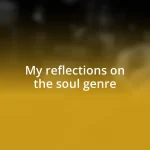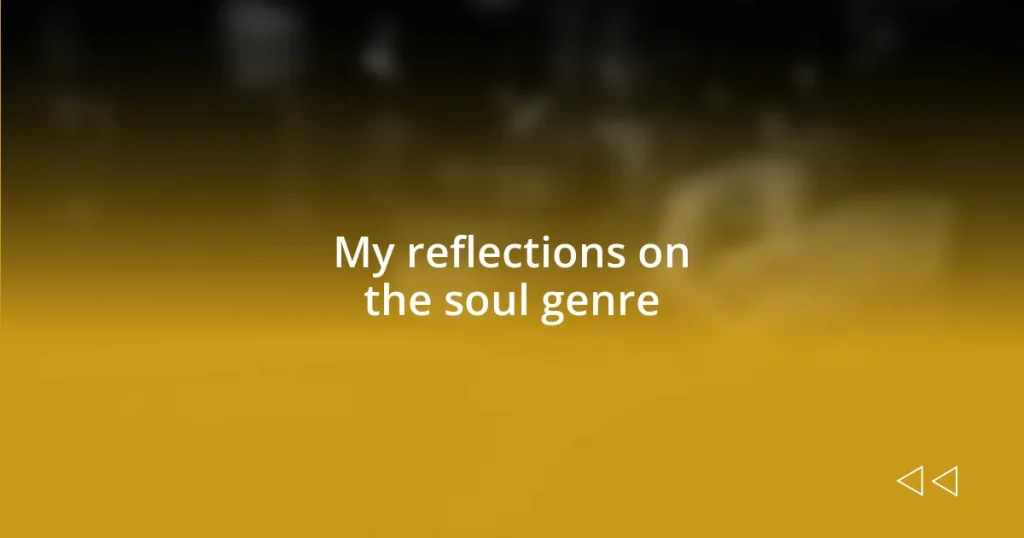Key takeaways:
- Soul music originated in the late 1950s and early 1960s, merging rhythm and blues, gospel, and jazz, and became an expressive tool for African American culture amid social struggles.
- Key artists like Aretha Franklin, Marvin Gaye, Ray Charles, and James Brown shaped the genre, using their music to inspire empowerment, social change, and innovative performance styles.
- Modern soul incorporates diverse influences and technology, allowing new artists to revive the genre while emphasizing community through collaborations and accessible platforms.
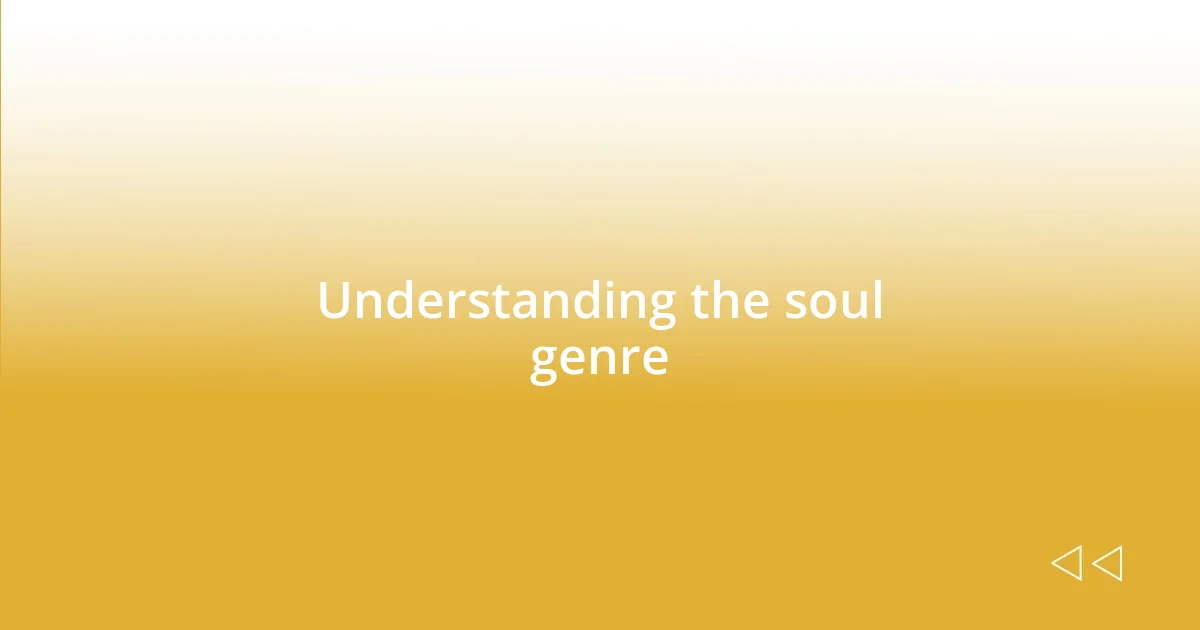
Understanding the soul genre
Soul music is a beautiful tapestry woven from the threads of rhythm and blues, gospel, and a bit of jazz. I remember the first time I truly felt the power of a soul ballad; it was as if the singer was reaching into my heart and pulling out my emotions. Have you ever experienced that spine-tingling moment when the music resonates so deeply that it feels like the artist knows your very soul?
At its essence, soul music is about expression and connection. The raw, heartfelt vocals often convey stories of love, pain, and joy—experiences that speak to our common humanity. I recall a late-night drive where I played Marvin Gaye’s “What’s Going On,” and it struck me how relevant its themes remain today. This genre invites listeners to reflect, to feel, and sometimes even to heal through its powerful messages.
What truly sets soul apart is its authenticity; it thrives on personal experiences and cultural roots. I often find myself reminiscing about my grandmother, who’d sing along to Aretha Franklin while she cooked. The laughter, the heartfelt moments, and even the tears—all became a part of my understanding of soul music’s profound impact. Isn’t it fascinating how music can shape our memories and connect us to our past?
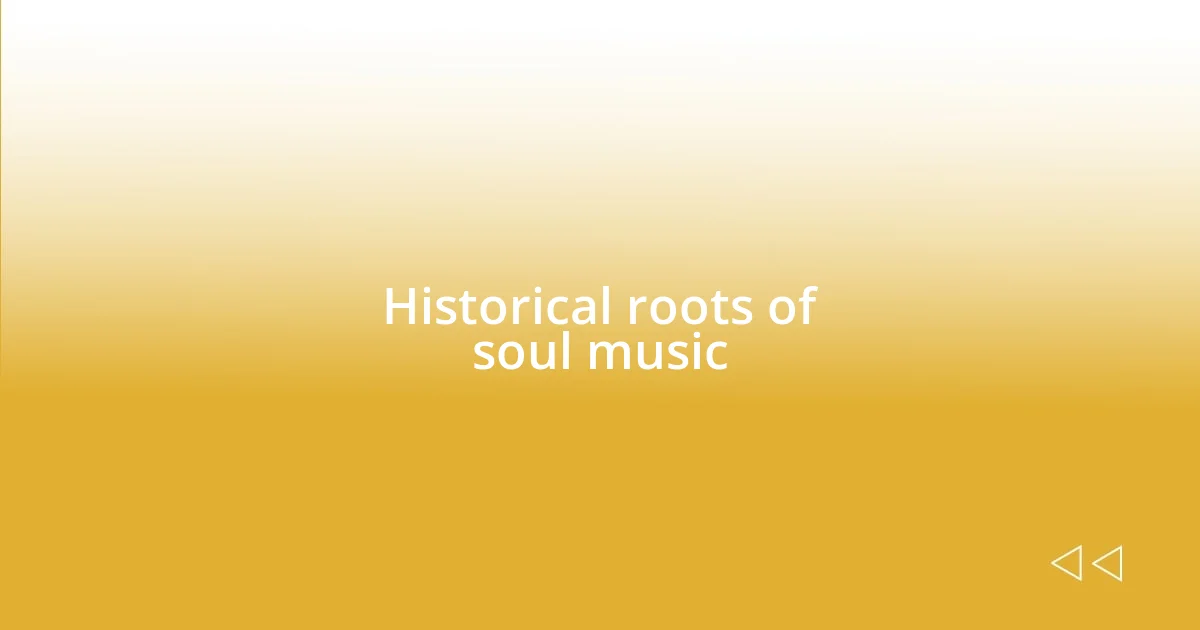
Historical roots of soul music
Soul music, with its rich historical roots, emerged as a powerful medium that intertwined African American culture and experiences. I often think about how the struggles and triumphs of a community can be woven into melodies that speak volumes. The genre grew from a confluence of rhythm and blues, gospel, and jazz, forming a foundation that resonates with raw emotion and authenticity.
- Originating in the late 1950s and early 1960s, soul music was a response to the social and political climate facing African Americans.
- Gospel’s influence is evident in the soulful vocal delivery and spiritual themes, which evoke a passionate connection with listeners.
- Iconic artists like Ray Charles and Sam Cooke blended various musical traditions, helping pave the way for modern soul.
- The Civil Rights Movement played a crucial role in shaping soul music, as songs became anthems for change and unity.
- Personally, I reminisce about carefree summer afternoons spent with friends, where we’d gather to listen to soul classics that sparked discussions about life, love, and freedom. These moments solidified my appreciation for how music can encapsulate a collective journey through hardship and celebration.

Key artists who shaped soul
Soul music’s evolution is deeply intertwined with the artistry of incredible musicians who brought their unique flavors to the genre. Artists like Aretha Franklin and Marvin Gaye didn’t just create music; they created movements. I vividly recall listening to Aretha’s powerful “Respect” at a community event, where it stirred a sense of empowerment among everyone present. It’s amazing how one song can unify people and inspire action, isn’t it?
Then we have Ray Charles, whose genius was in blending gospel with rhythm and blues, forging a path for countless artists. I remember hearing his rendition of “Georgia on My Mind” during a quiet afternoon, and it struck me how his emotive style transformed a simple song into a heartfelt serenade. It’s moments like that which remind me of how soul music transcends time, reaching us on levels we often don’t expect.
Another pivotal artist is James Brown, known as the “Godfather of Soul.” His energetic performances and relentless drive revolutionized music, making it more than just a listening experience. I once attended a tribute concert for him, and witnessing the audience’s electrifying reactions filled me with nostalgia for the way music can ignite such passion and joy. I often wonder: how do these artists continue to influence new generations? Their legacies are woven into the very fabric of soul music and continue to inspire.
| Artist | Impact |
|---|---|
| Aretha Franklin | Empowerment anthem in “Respect”; defined female strength. |
| Marvin Gaye | Blended social messages with soulful melodies; timeless classics. |
| Ray Charles | Pioneered the fusion of gospel with rhythm and blues. |
| James Brown | Revolutionized performance style; sparked funk movement. |
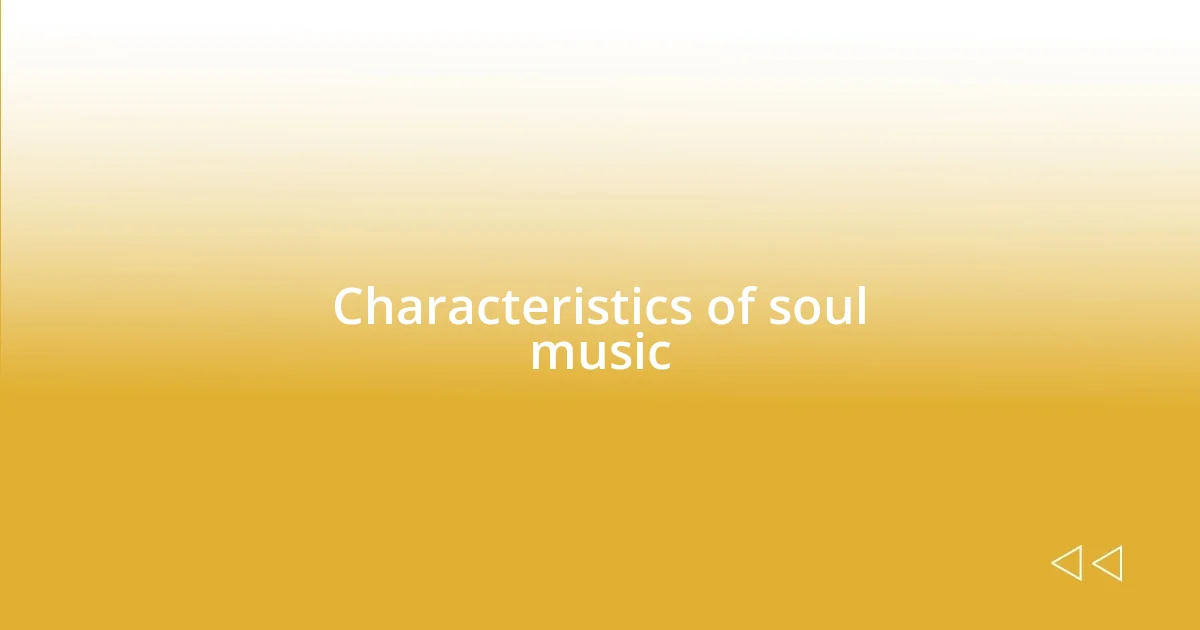
Characteristics of soul music
Soul music is marked by its emotive vocal performances, often characterized by powerful, expressive singing that conveys deep feelings. I think about how the vocals in soul songs can take you on an emotional rollercoaster, sending chills down your spine. When you hear an artist pouring their heart into a ballad, it feels as if they are sharing their most intimate stories. Have you ever felt like a song was telling your own story?
Instrumentation adds another layer of richness, with horns, bass, and keyboards creating a lush backdrop that complements the vocals. There’s something compelling about the way these elements blend; it feels almost like a conversation between instruments and voice. I remember listening to a live soul band where the brass section kicked in, and the energy shifted completely—it was infectious! The arrangement makes every song an experience, wrapping you in a soundscape that captures the essence of the moment.
Finally, soul music often incorporates themes of love, struggle, and social consciousness, reflecting both personal and collective experiences. I find it fascinating how a single song can resonate on multiple levels, addressing individual emotions while also echoing broader societal issues. When I listen to “A Change Is Gonna Come” by Sam Cooke, I’m reminded of its historical significance, yet it still feels deeply personal and relevant today. Do you find that connection in your own favorite soul tracks?
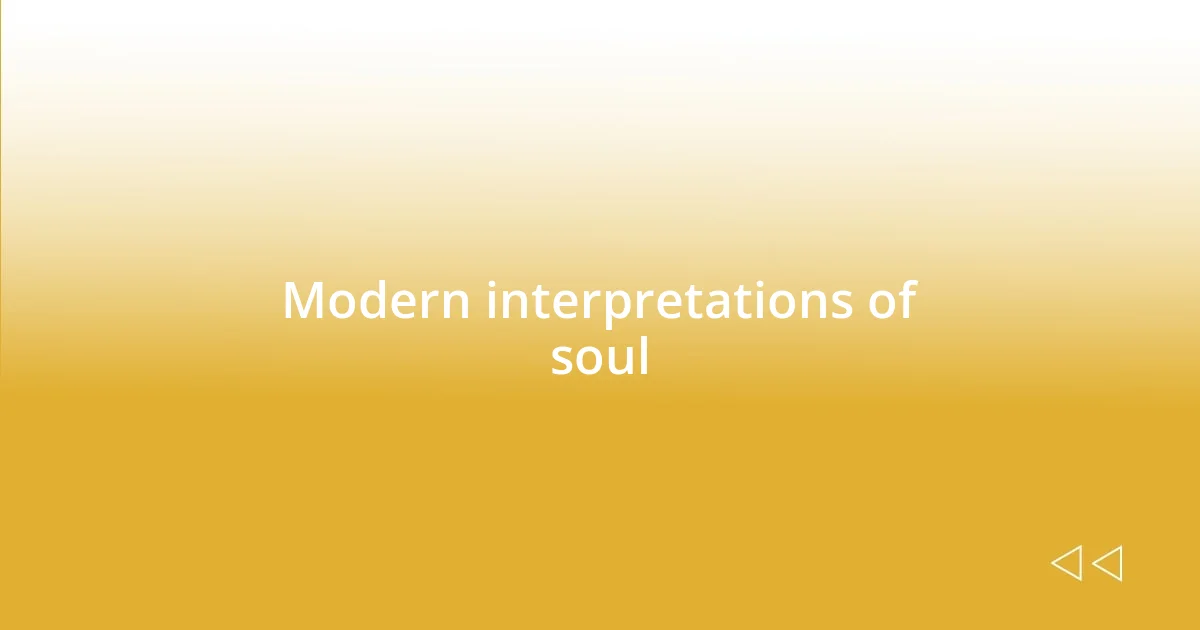
Modern interpretations of soul
Modern soul has taken on a myriad of forms, often melding with different genres to create something fresh and resonant. For instance, artists like Leon Bridges and Anderson .Paak are revitalizing soul by infusing it with elements of hip-hop and R&B. I recall listening to Bridges’ “Coming Home” for the first time, and how his smooth, vintage style made me feel like I was transported back to the golden age of soul, yet with a contemporary twist. Have you ever had that experience where a new artist makes you feel something familiar yet fresh?
Collaborations have also become a hallmark of modern interpretations, as seen with powerhouse duos like Common and Erykah Badu. Their work not only highlights individual talents but also emphasizes the importance of community and artistic synergy. At one point, I was attending a festival where they performed, and their chemistry on stage was electrifying—it reminded me of the way soul music thrives on connection and storytelling. Isn’t it beautiful how these collaborations can create a dialogue between artists and their audiences?
Moreover, the use of technology has reshaped how soul music is produced and consumed. With platforms like Spotify and YouTube, emerging artists can reach global audiences in an instant. I remember coming across a young singer on social media whose soulful voice and authentic lyrics struck me; it felt like a modern revival of the genre, breathing life into its timeless core. Have you discovered any hidden gems that have made you appreciate the evolving landscape of soul?
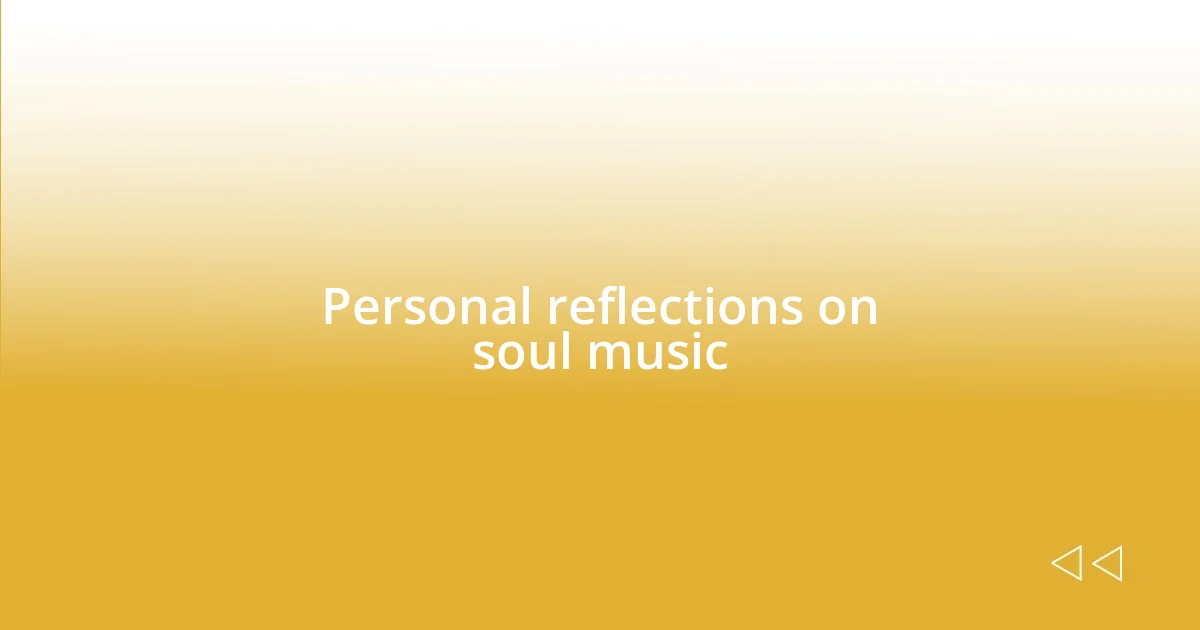
Personal reflections on soul music
Listening to soul music has always felt like diving into a warm ocean of emotions for me. I remember a rainy Saturday when I stumbled upon Otis Redding’s “Try a Little Tenderness.” The way his voice climbed and fell with such raw passion made me feel like he was right there in the room, singing just for me. It’s hard not to get swept up in that kind of connection—doesn’t it feel incredible when a song resonates so deeply that it feels like it knows your heart?
One of the most striking aspects of soul music is its ability to evoke nostalgia while still feeling contemporary. I think back to a family gathering where my uncle put on some classic Al Green tracks. Everyone started sharing their own memories tied to those songs, creating a beautiful tapestry of stories that spanned generations. That moment reinforced for me how soul music serves as a bridge between the past and present, inviting us to connect over shared experiences and emotions, right?
I also think about how the genre empowers listeners to explore their own vulnerabilities. There’s something undeniably therapeutic about belting out a soulful tune in the car, the lyrics becoming a catharsis amidst daily hustle. I often find myself getting lost in the heartfelt melodies, which transform my mundane commute into a space of reflection. Have you ever found solace in music during tough times? For me, soul has this profound ability to mirror life’s struggles, offering healing and understanding through its heartfelt rhythms.





